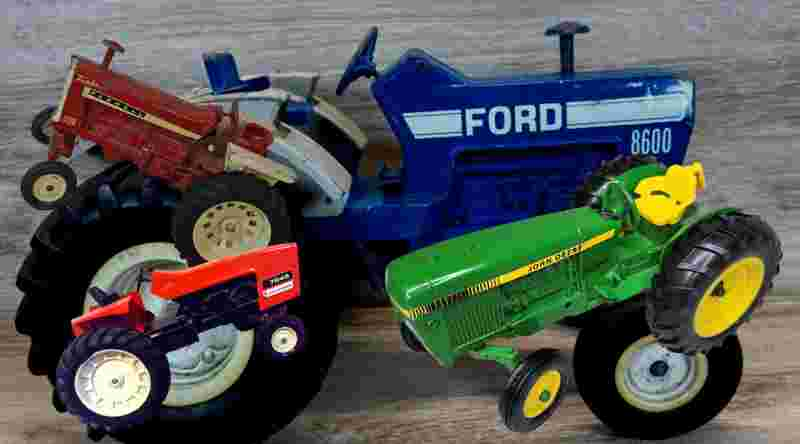Consumers are familiar with the cola wars, the PC wars, the FedEx/UPS wars, and the fast-food wars. But the tractor wars? Neil Dahlstrom is a historian and archivist for John Deere, and he’s the author of Tractor Wars, a historical narrative of the race to be the top manufacturer of power farming at the turn of the twentieth century. Will it be International Harvester, Ford, or the much smaller player, John Deere?
Episode Highlights
- Neil’s work at John Deere as a historian and business archivist
- Early 1900s Power-Farming
- The myth of John Deere getting its start in manufacturing tractors
- The reason young people were leaving the farms
- The period that the tractor wars begin to take shape
- The powerful and unrelenting force of Henry Ford’s tractor
- The cause of the tractor wars
- Customers who did and didn’t cross the chasm
- Rollups did not start in the 1970s and 1980s
- Ford’s pricing war

Mark’s Stump the Expert Game
- T or F – The typical family farm at the turn of the 20th century included more than 160 acres of tillable land.
- T or F – Henry Ford was addicted to generating big profits with his tractor manufacturing.
- T or F – Gasoline and kerosene powered the very first tractors.
- T or F – The first tractors were beautiful works of art.
- T or F – Ford’s implement business was as profitable as its tractor business.
- T or F – The American farmer in the early 1900s was not in a hurry to replace the horse.
- Fill in the blank – A generation ago, farming was an occupation. Today, it’s a ________.
- T or F – Deere started work on a small tractor in 1914 to sell at around $700.
- What were the three colors of Deer’s Waterloo Boy?
- T or F – The first Ford tractors manufactured for mass production included the Ford name.

Reflections on Tractor Wars
I purchased Tractor Wars blindly. When the title hit my email from Amazon, I bought it immediately, and I was not disappointed with this historical business narrative.
When I think of the tractor industry, International Harvester and John Deere quickly spring to mind, not Ford.
Ford was adamant about getting a tractor on every farm in America, and we learn why from this line in the book:
“Power is utilized to the least possible degree. Not only is everything done by hand, but seldom is a thought given to logical arrangement. A farmer doing his chores will walk up and down a rickety ladder a dozen times. He will carry water for years instead of putting in a few lengths of pipe. His whole idea, when there is extra work to do, is to hire extra men. He thinks of putting money into improvements as an expense.”
Dahlstrom, Neil. Tractor Wars
Neil adds, “To Ford, the waste of farm inefficiency led to wasted effort, high prices, and low profits.
While Ford went against the wishes of his son and the Board of Directors in wanting to manufacture a tractor for the masses, he still had boundaries he adhered to:
- the price point for customers had to be cheap
- it had to be easy to operate
- it had to be able to burn gas, kerosene, or alcohol
- simple to construct on the plant floor, and
- could be built in vast quantities
In 1922, the Board of Directors at John Deere posited a similar set of guidelines for selling its tractors (per page 180):
- The International Harvester Titan and Fordson are “our main competition.”
- A new tractor should be a three-plow tractor meeting the requirements of 75 percent of that trade, based on the same way that the Fordson met 75 percent of the two-bottom plow trade.
- A new tractor should sell for $1,000 “under normal conditions.”
Tractor Wars reminds me of a modern-day saga of one industry and its central characters duking it out with one another. The book is replete with creative marketing, pricing wars, strategic acquisitions, luring great talent away from competitors, the entrepreneurial swarm of new entrants to a young industry, and the plight of the underdog.
Questions to consider after reading the book:
- How did John Deere, a small player in tractor manufacturing, eventually start producing nearly a quarter of the nation’s tractors?
- Why didn’t Ford manufacture implements? Should they have done so?
- Should Henry Ford have listened to his son Edsel in staying away from the tractor industry?
- Why did it take until 1945 for tractor horsepower to exceed the power of horses on American farms? What’s the big takeaway as it relates to innovation of any kind?
- In the early 1900s, the United States lagged well behind other countries’ wheat per yield. Why?

Leave a Reply